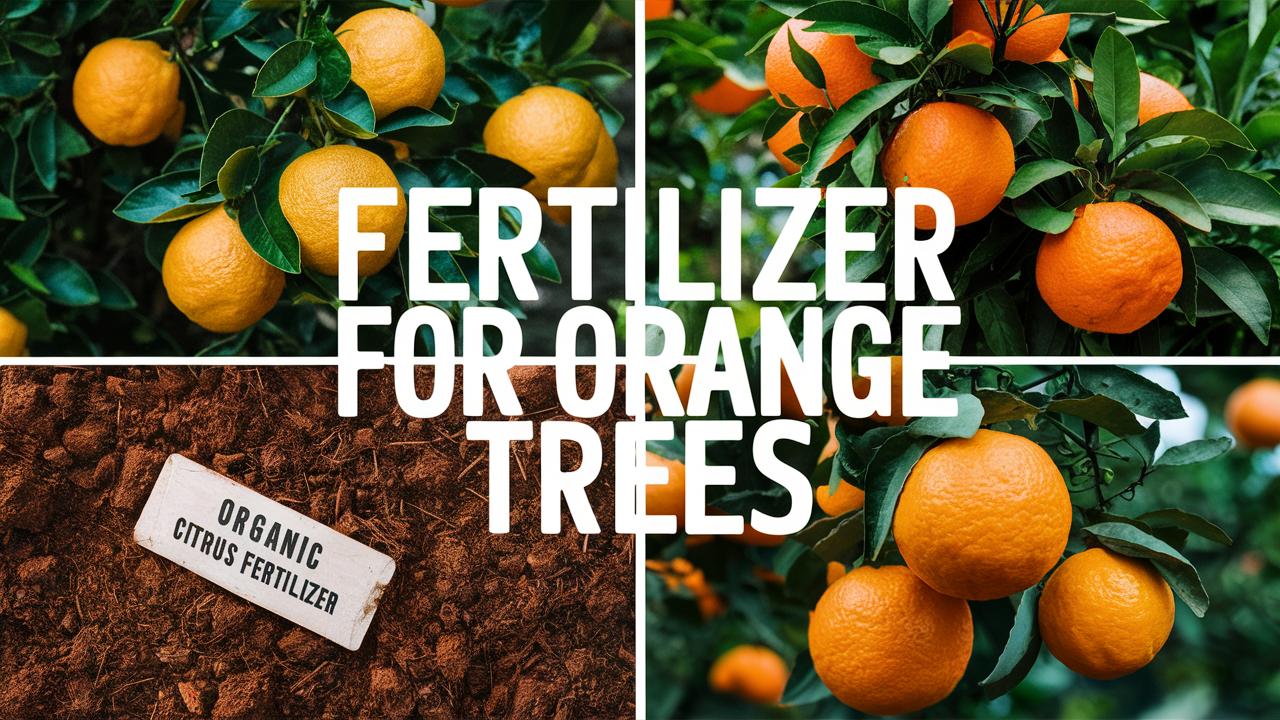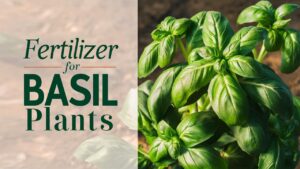This guide will help you choose the right fertilizer for your orange trees, ensuring they receive the nourishment they need to grow healthy and productive.
Fertilizer For Orange Trees
| Image | Name | Rating | Shop |
|---|---|---|---|
 | Citrus Tree Food |  | |
 | Citrus FeED |  | |
 | Citrus & Avocado Fuel |  |
Citrus Tree Food
This fertilizer is a good option for orange trees. It is specifically formulated for all types of citrus trees including oranges and can be used both indoor or outdoor.
The Farmer’s Secret Citrus Tree Booster Fertilizer comes highly concentrated, allowing you to apply it with just one teaspoon per gallon of water on a weekly basis. The recommended dosage adjusts according to the size of the tree: one teaspoon for young trees in their first season and up to two teaspoons for mature trees. For container or indoor trees, cut down the dosage or apply the fertilizer every other week.
Citrus FeED
For orange trees, we recommend using Jack’s Classic 20-10-20 Citrus Feed Water-Soluble Fertilizer. This product provides a balanced formula that promotes healthy leaf growth, sturdy branches, and an ample fruiting process, particularly suited for tropical fruiting plants like oranges.
You can use this fertilizer in various ways – just mix the powdered concentrate with water to create multiple gallons of liquid fertilizer, spray it directly onto leaves or roots, or integrate it into a continuous feed system. The included measuring spoon makes it easy to determine the right amount for your trees’ needs. With added micronutrients, you can provide optimal growth and health without needing additional supplements.
Citrus & Avocado Fuel
If you’re in the market for a fertilizer specifically designed for your orange trees, I’d recommend checking out the FoxFarm Happy Frog Citrus & Avocado Fertilizer. This palm-spray-like organic formula is tailored to meet the unique needs of citrus and avocado trees, promoting bountiful ripened fruits with its nitrogen-rich blend.
This fertilizer’s got everything you need – nitrogen for healthy growth, calcium to fortify cell structure, and sulfur to enhance nutrient absorption. Plus, it contains mycorrhizal fungi that boost root strength and resilience, making for happy trees in no time! And don’t worry about complicated application instructions – simply sprinkle 1-3 cups of fertilizer around your tree three times per growing season, depending on its size.
Fruit & Citrus Fertilizer Spikes
If you’re in the market for a fertilizer specifically designed for orange trees, we’d recommend checking out Jobe’s Garden Fertilizer Spikes. This product is designed with citrus plants like oranges in mind, providing them with the necessary nutrients for high yields and vibrant foliage. The 8-11-11 NPK ratio is carefully formulated to meet the needs of fruit and citrus plants.
We like that this fertilizer is convenient to use – simply apply it twice a year during early spring and late fall, or as needed during the growing season. And because Jobe’s spikes are designed to release their nutrients slowly, you don’t have to worry about over-fertilizing or messy waste. With 9 count packs available, you can easily keep your orange trees thriving all year round.
GardenWise Citrus Fertilizer
For your orange tree, we recommend using Professional Citrus Fertilizer + Vital Micronutrients. This product is specifically designed for citrus trees, offering a balanced NPK formula that promotes growth and flowering.
This fertilizer contains 6% nitrogen for growth, 4% phosphorus for flowering, and 6% potassium for fruit quality, as well as micronutrients like magnesium, zinc, copper, iron, and boron that help to optimize plant health. The all-in-one formula streamlines garden care and reduces the need for multiple products, making it a convenient option for growers of all experience levels. With Professional Citrus Fertilizer + Vital Micronutrients, you can expect a remarkable yield boost and vibrant foliage, making it an excellent choice for your orange tree.
Organic Fertilizer Spikes for Fruit and Citrus Plants
Fruit and citrus trees, like orange trees, can greatly benefit from a well-formulated organic fertilizer. Jobe’s Organics Garden Fertilizer Spikes is an excellent option that provides the necessary nutrients for optimal growth and productivity.
The spikes are easy to apply and come in a 6-pack format, perfect for multiple citrus trees or long-term usage. The formula features a balanced NPK ratio of 3-5-5, which promotes healthy foliage and high fruit yields without over-fertilizing your plants. As an organic product, it’s free from synthetic chemicals and is OMRI listed by the USDA for use in organic gardens.
Jobe’s Organic Fertilizer Grains
This product, Jobe’s Organics Granular Garden Fertilizer, seems like a good option for orange trees. It promises to provide nutrients that promote high yields and vibrant foliage with its NPK ratio of 3-5-5.
The fertilizer is organic, containing no synthetic chemicals, which can be beneficial for gardens where chemical use is limited or avoided. Additionally, it’s easy to measure out the right amount needed, reducing the risk of over-fertilizing. The product also claims to prevent wasteful runoff and has a simple application process that should be done every 4-8 weeks during the growing season.
EZ-Gro
This citrus tree fertilizer has everything you’ll need to grow lush, thriving orange trees. The 20-3-19 NPK formula ensures the ideal balance of nutrients for maximum growth and fruit production. Plus, it’s infused with micronutrients that target common issues like yellowing leaves and poor fruit set.
This liquid fertilizer is perfect for citrus and tropical trees like oranges, lemons, limes, mangoes, and avocados. It’s tailored to meet the unique needs of these plants, giving them a nutrient boost that delivers fast results. Simply mix with water and watch your orange tree flourish – you’ll see drooping leaves lift within just hours!
Citrus Fertilizer Concentrate
This product from Gardenera should work well for your orange tree. It’s a liquid concentrate that provides an organic and balanced blend of nutrients specifically tailored to meet the needs of indoor citrus trees.
The fertilizer has a 3-1-2 concentration, which means it contains three parts nitrogen, one part phosphorus, and two parts potassium per gallon of water. This formulation is similar to what you’d find in most commercial fertilizers, but this product’s organic nature ensures that your tree won’t be damaged by harsh chemicals. Follow the dosage instructions provided, using one teaspoon of the concentrate mixed with one gallon of water for optimal results.
Citrus Mix Fertilizer
If you’re looking for a reliable fertilizer for your orange tree, we recommend Down to Earth Organic Citrus Fertilizer Mix 6-3-3. This OMRI-listed organic fertilizer is specifically designed for citrus trees, but can also be used on other types of fruit trees, vines, and ornamentals.
This blend of primary and secondary plant nutrients, including calcium, sulfur, zinc, and iron, provides your orange tree with the right balance of nitrogen, phosphorus, and potassium to promote healthy growth, lush foliage, fragrant blossoms, and a bountiful harvest. With its unique combination of natural ingredients like feather meal, fish bone meal, and alfalfa meal, this fertilizer mix is a great choice for organic gardeners who want to avoid synthetic chemicals while still getting top-notch results.
Organic Citrus Fertilizer
This is a good option if you’re looking to fertilize your orange trees in an environmentally friendly way. The Bloom City’s Organic Citrus & Fruit Fertilizer is specifically designed for citrus trees, and it contains all the necessary nutrients they need to thrive.
The fertilizer is made from natural sources and has a slow-release formula that provides sustained nutrient availability. This means your plants will receive a consistent supply of food over an extended period, promoting healthy growth and fruit production. Additionally, this organic fertilizer helps create a balanced garden ecosystem by supporting beneficial soil microorganisms. It’s a solid choice for anyone looking to naturally boost their orange tree’s health and yield.
Understanding Nutrient Requirements
Before selecting fertilizer, it’s important to understand the basic nutrient requirements of orange trees. These trees need a balance of macronutrients and micronutrients:
Macronutrients:
Nitrogen (N): Essential for leaf growth and overall vigor.
Phosphorus (P): Important for root development and fruit production.
Potassium (K): Vital for fruit quality and disease resistance.
Micronutrients:
Calcium: Crucial for strong cell walls and preventing blossom end rot.
Magnesium: Important for photosynthesis and overall tree health.
Iron: Necessary for chlorophyll production and leaf greenness.
Knowing these requirements aids in choosing the right fertilizer blend.
Soil Testing: A Crucial First Step
Before you can choose the appropriate fertilizer, conducting a soil test is critical. This test will help you understand the current nutrient levels, soil pH, and organic matter content. Proper soil pH for orange trees typically ranges between 6.0 and 7.0. Here’s how to get started:
Collect Soil Samples: Take samples from various locations around the intended planting site, approximately 6-12 inches deep.
Send to a Lab: Many agricultural extensions and gardening centers offer soil testing services.
Interpreting Results: Understand the nutrient levels and pH. This information will dictate what amendments or fertilizers are needed.
With the results in hand, you can make an informed decision about which fertilizers will complement the existing soil nutrient profile.
Types of Fertilizers
Fertilizers come in two primary categories: synthetic and organic. Both have their pros and cons and can serve orange trees well when chosen correctly.
Synthetic Fertilizers
These rapidly available nutrients can lead to fast growth and fruiting. Common options for orange trees include:
Granular Fertilizers: Typically slow-release and easy to apply. Look for NPK ratios appropriate for citrus, such as 8-4-8 or 15-5-10.
Water-Soluble Fertilizers: Quick to soak into the soil, promoting immediate nutrient uptake. Used sparingly, they can boost growth during the critical growing season.
However, synthetic fertilizers can leach away quickly in heavy rains and may lead to nutrient imbalances if not carefully monitored.
Organic Fertilizers
Organic options can improve soil health over time and provide a slow, steady release of nutrients. Some popular choices include:
Compost: A natural source of a variety of nutrients and beneficial microorganisms. It enhances soil structure and moisture retention.
Fish Emulsion: A nitrogen-rich liquid fertilizer that promotes vigorous foliage growth.
Bone Meal: High in phosphorus, this is excellent for root development and fruiting.
While organic fertilizers generally take longer to show results, they contribute to the overall health of the soil ecosystem, making them a wise long-term choice.
Consider the Growth Stage of Your Orange Tree
The nutrient needs of your orange tree will vary significantly depending on its growth stage. Here’s a breakdown:
Young Trees
For newly planted orange trees, a balanced fertilizer with a higher percentage of nitrogen is ideal, as it boosts foliage growth. Look for fertilizers with an NPK ratio like 3-1-2. Application should be done lightly to avoid burning young roots. Fertilize about 6 to 8 weeks after planting to encourage root establishment.
Established Trees
Once your orange tree has established itself and starts producing fruit, it’s time to shift to a fertilizer that prioritizes phosphorus and potassium, like 8-2-10 or 10-10-10. This supports both fruit development and overall health. Fertilizing in late winter or early spring will set the stage for fruitful growth.
Fruit Production Season
During the fruiting season, which varies but often peaks in summer, a boost in potassium is beneficial. Look for a fertilizer like 10-5-20 to enhance fruit size and quality. Be sure not to over-fertilize, as this can lead to excessive foliage at the expense of fruit.
Application Techniques
Proper application techniques are essential for ensuring that your orange trees absorb nutrients effectively. Here are a few tips for optimal application:
Timing: Early spring is the best time to apply fertilizer to support new growth. For established trees, a second application during the summer may be helpful.
Method: For granular fertilizers, apply evenly around the drip line (the area directly under the tree’s canopy). This area will be where roots primarily absorb water and nutrients.
Watering: Always water thoroughly after fertilizing to help nutrients penetrate the soil and reach the roots.
Frequency: Follow the manufacturer’s recommendations for frequency and amounts. Over-fertilizing can cause salt buildup in the soil, harming the tree.
Watch for Signs of Nutrient Deficiency
Even with the right fertilizer regimen, orange trees can exhibit signs of nutrient deficiencies. Keeping an eye on your tree’s health can guide your fertilization practices. Common symptoms include:
Yellowing Leaves: This can indicate nitrogen deficiency or poor soil health. If the older leaves yellow while new growth remains green, it’s likely nitrogen deficiency.
Poor Fruit Development: Lack of phosphorus can result in small, underdeveloped fruit.
Leaf Curling or Drop: This could signify a potassium deficiency or possibly an issue with watering and drainage.
Understanding these signs will enable you to address nutrient deficiencies promptly and adjust your fertilization strategy accordingly.
Seasonal Fertilization Schedule
Creating a seasonal fertilization schedule can take the guesswork out of providing your orange tree with the nutrients they need. A typical schedule might look like this:
Early Spring (February-March):
Apply a balanced fertilizer to stimulate new growth.
Ensure the soil is moist to promote nutrient uptake.
Late Spring to Early Summer (May):
Reassess the tree’s growth and apply a potassium-rich fertilizer if necessary to support fruit development.
Late Summer (August):
Apply a final round of fertilizer to help trees maintain their energy and prepare for dormancy.
Autumn (September):
Stop fertilizing as trees prepare for dormancy. This period should focus on watering and possibly mulching around the base to conserve moisture through winter.
Adjusting for Climate and Soil Conditions
Different climates and soil types will affect the nutrients available to your orange trees. For instance, sandy soils may drain quickly and lose nutrients faster compared to clay soils, which hold onto water and nutrients more tightly.
Coastal Areas
In coastal regions with high rainfall or salty air, consider using fertilizers that are specifically formulated for oranges and other citrus varieties. Organic mulches rich in nutrients can also help mitigate salt buildup.
Arid Regions
In drier climates, the use of slow-release fertilizers can help maintain a steady supply of nutrients without the risk of leaching away during rain events. Pay attention to watering practices, as consistent moisture is crucial for nutrient absorption.
Sustainable Practices
As gardeners, focusing on sustainable practices while caring for orange trees leads to a healthier environment and more resilient trees. Here are a few sustainable tips:
Use Cover Crops: Planting cover crops can improve soil structure, increase organic matter, and enhance nutrient availability. Legumes, for instance, can fix nitrogen in the soil naturally.
Compost Regularly: Incorporating compost not only feeds your trees but improves overall soil health, biodiversity, and water retention.
Practice Crop Rotation: If possible, avoid planting citrus trees in the same location year after year. Rotating crops can diminish disease buildup and aid in nutrient management.
Avoid Chemical Pesticides: Whenever feasible, opt for organic pest control methods that target specific pests without harming beneficial insects. This contributes to a balanced ecosystem that supports your orange tree’s health.













